Fiction
Fiction
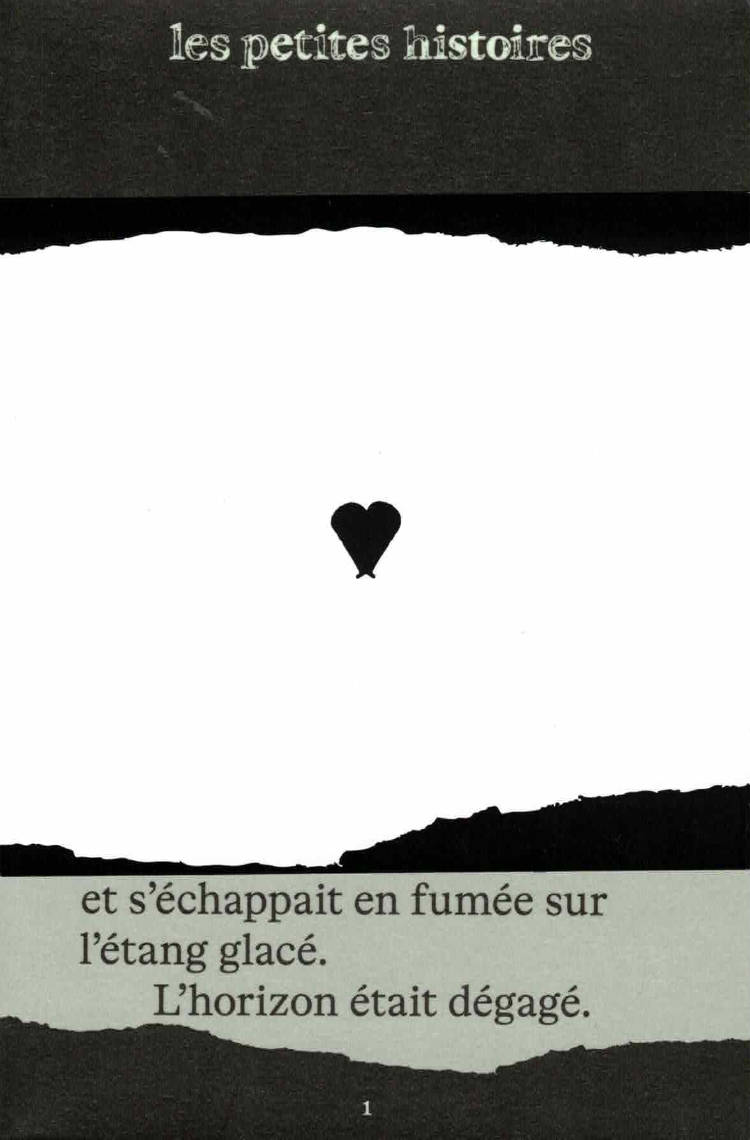
les petites histoires
Sam Buouffandeau, S. M. Drogo and 2 more
les petites histoires sont quatre courtes fictions contemporaines. Entre le lonely langoureux New York des années deux mille, le pont poétique et capricieux de Louis 2 de Bavière, l'histoire vraie de Sandy Stone dans les seventies et la satire cinglante et drôle d'une galerie d'art, ces livres sont de brefs univers vivants et curieux.
En 2025, quatre petites histoires sont racontées par quatre auteurices dans quatre livres : L'effondrement du pont de Sam Bouffandeau ; The Gallery de S. M. Drogo ; Exit de Juli Le Nahelec; «Que faire de Sandy Stone?» de Mia Trabalon.
L'édition des petites histoires a été imaginée par Élise Comte, Chloé Delchini, Perrine Estienne, Gabriel René Franjou, Justine Gensse, Bastien Hauser, et Cyprien Muth. Ce collectif d'éditeurices est né à Bruxelles, où les petites histoires ont été imprimées, chez Graphius.
La maquette, réalisée par Chloé Delchini, à été composée avec Otto, une typographie dessinée par Sam de Groot et Laura Opsomer Mironov, chez Dinamo Typefaces.
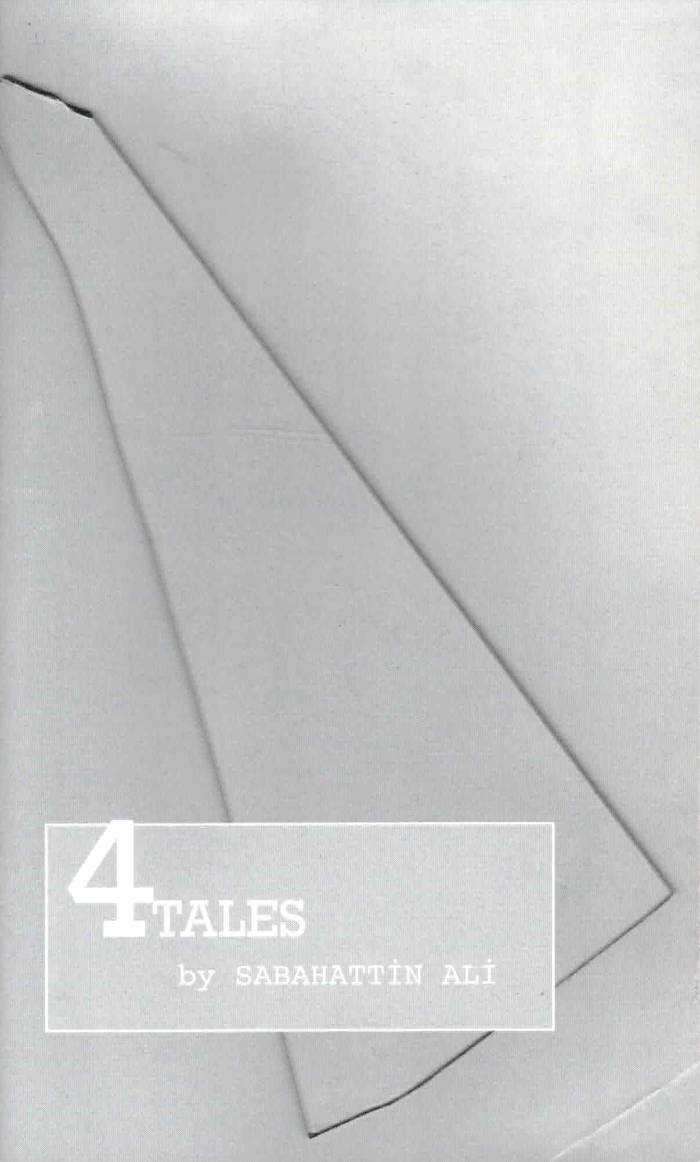
4 Tales
The power of Sabahattin Ali comes from beyond his words. It is his sense of observation, insight and commitment to fight for a fairer society that have carried his voice into the modern day.
The four tales in this book - Death of the Giants, A Tale of Love, A Tale of Sheep and The Glass Pavilion - were compiled and published in Sırça Köşk [The Glass Pavilion] in 1947. At the time Sabahattin Ali penned these tales, the young Turkish Republic was still struggling to establish a proper democracy with one sole party in parliament. In 1948 the Turkish Council of Ministers decided to ban Sırça Köşk, and all remaining copies were swiftly confiscated. Even after his death, the words of Sabahattin Ali were deemed as a governmental threat and for decades publishers were reluctant to print his work.
Almost eighty years later, these political and social tales remain just as poignant. Does this showcase Sabahattin Ali’s visionary spirit or a general lack of vision within our societies?

Nova Scotia House
Nova Scotia House takes us to the heart of a relationship, a community and an era, both a love story and a lament.
In this profound meditation on grief, Johnny looks back at his relationship with his life partner, Jerry, after his AIDS-related death. When they met, nearly thirty years ago, Johnny was 19, Jerry was 45. They made a life on their own terms in Jerry’s flat: 1, Nova Scotia House. Johnny is still there today—but Jerry is gone, and so is the world they knew.
Intimate, visionary, and profoundly original—as well as raw, hot, and hilarious—Nova Scotia House marks the debut of a vibrant new voice in contemporary fiction.
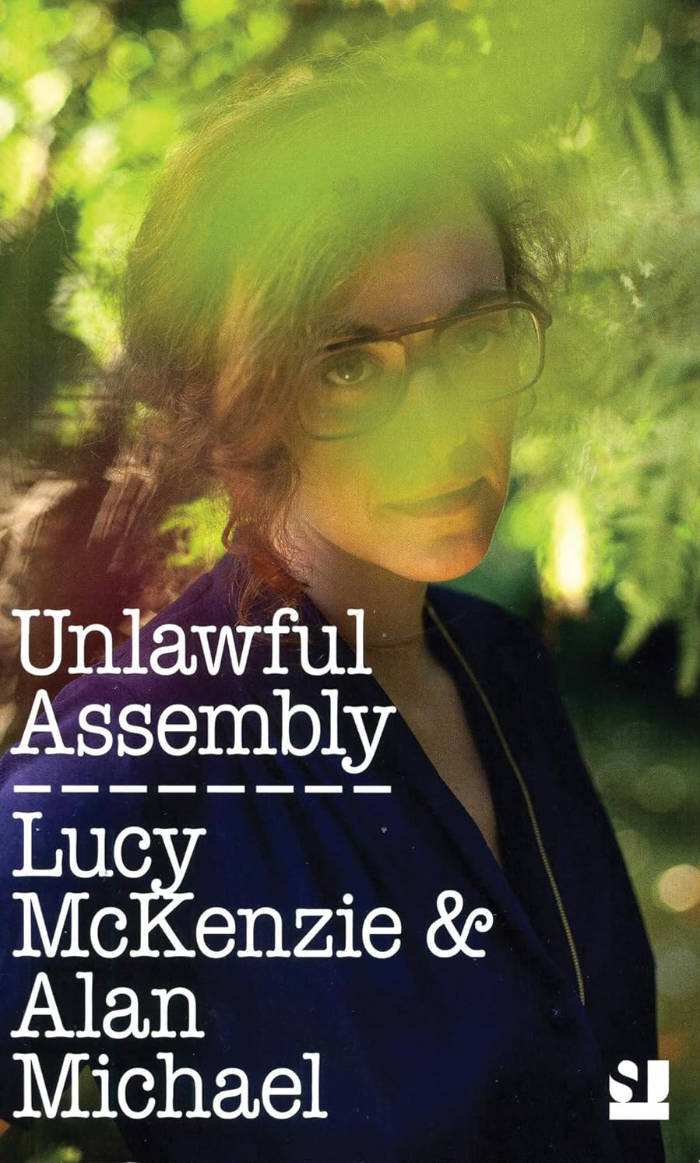
Verlag der Buchhandlung Walther König
Unlawful Assembly
A collection of interrelated short stories by Lucy McKenzie and Alan Michael. First published in private limited edition, it was intended as a cheap holiday read to titillate and entertain summer visitors to the Mediterranean island of Stromboli, and as a piece of site-specific work; the location of the action and the place in which it is read being the same.
The visual art subsequently generated by Unlawful Assembly includes work by Josephine Pryde, with whom the artists collaborated to produce this second edition’s cover image.
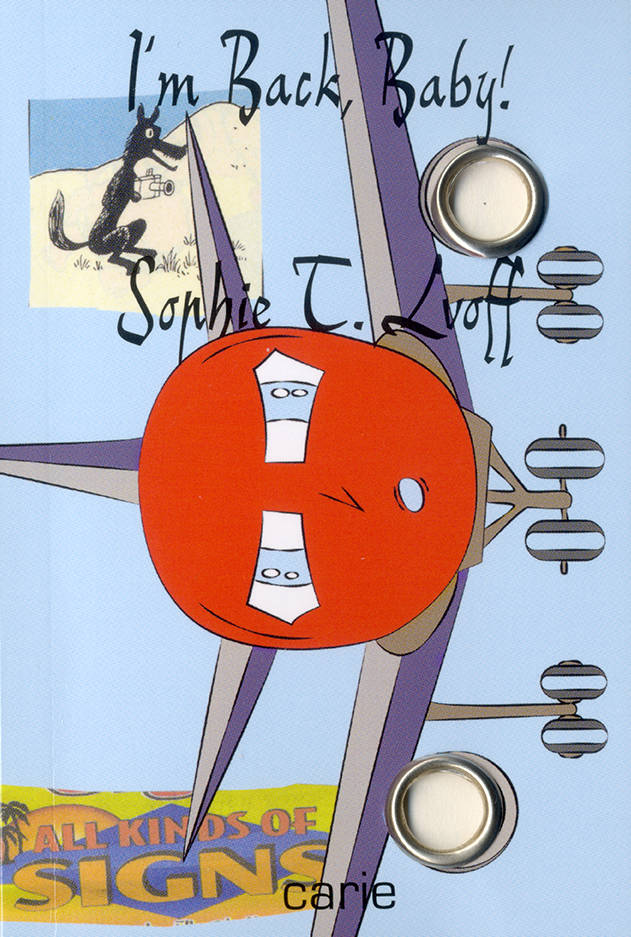
I'm Back, Baby!
Après la naissance de sa baby girl, Sophie T. Lvoff tente de faire son come-back dans l’art contemporain. Elle doit se rendre au vernissage de son exposition dans un Kunstverein en Allemagne. Juste avant, elle emmène ses étudiant·es à Sainte-Marie-de-la-Mer en Camargue pour prendre des photos de flamants roses et de couchers de soleil mais rien ne se passe comme prévu…
After the birth of her baby girl, Sophie T. Lvoff tries to make her comeback in contemporary art. Before heading to the opening of her exhibition at a Kunstverein in Germany, she takes her students to Sainte-Marie-de-la-Mer in the Camargue to photograph flamingos and sunsets, but nothing goes as planned…
A manicure would be a good thing to do for her international comeback, but perhaps that could happen in Munich later.
(I'm Back, Baby!)
Carie, comme le trou qu’on bouche au plomb, est une collection de textes courts et moyens qui se glissent dans la poche. Chaque livre (la dent) de la collection (la bouche) est troué (la carie) et cerclé d’un œillet métallique (le plombage).
Carie, like the hole filled with lead, is a collection of short and medium-length texts that slip into the pocket. Each book (the tooth) in the collection (the mouth) is holed (the cavity) and circled with a metal eyelet (the filling).
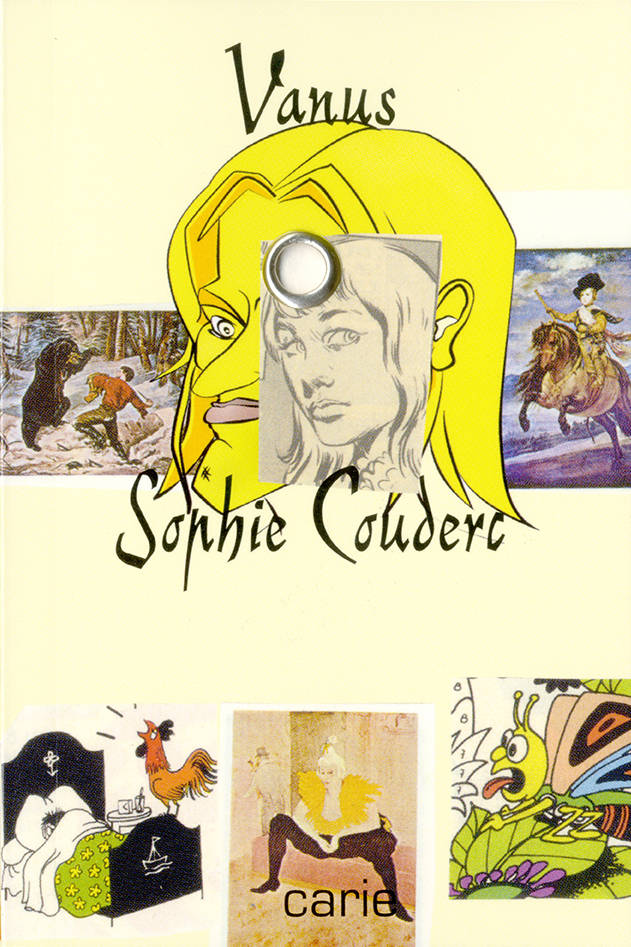
Vanus
Vanus übermann des villes, le roi de la ville, le roi du monde, se fait des odes à lui-même et met ses chaussettes dans la pâte à pain. Sophie Couderc raconte quelques-unes de ses péripéties.
Vanus übermann of the cities, the king of the city, the king of the world, writes odes to himself and puts his socks in bread dough. Sophie Couderc recounts some of his adventures.
Je jette le matelas dehors, il rebondit sur trois cons et tombe dans une grosse flaque de jus de rue. Ok, pas mal mais il m’en faut plus. (Vanus)
Carie, comme le trou qu’on bouche au plomb, est une collection de textes courts et moyens qui se glissent dans la poche. Chaque livre (la dent) de la collection (la bouche) est troué (la carie) et cerclé d’un œillet métallique (le plombage).
Carie, like the hole filled with lead, is a collection of short and medium-length texts that slip into the pocket. Each book (the tooth) in the collection (the mouth) is holed (the cavity) and circled with a metal eyelet (the filling).
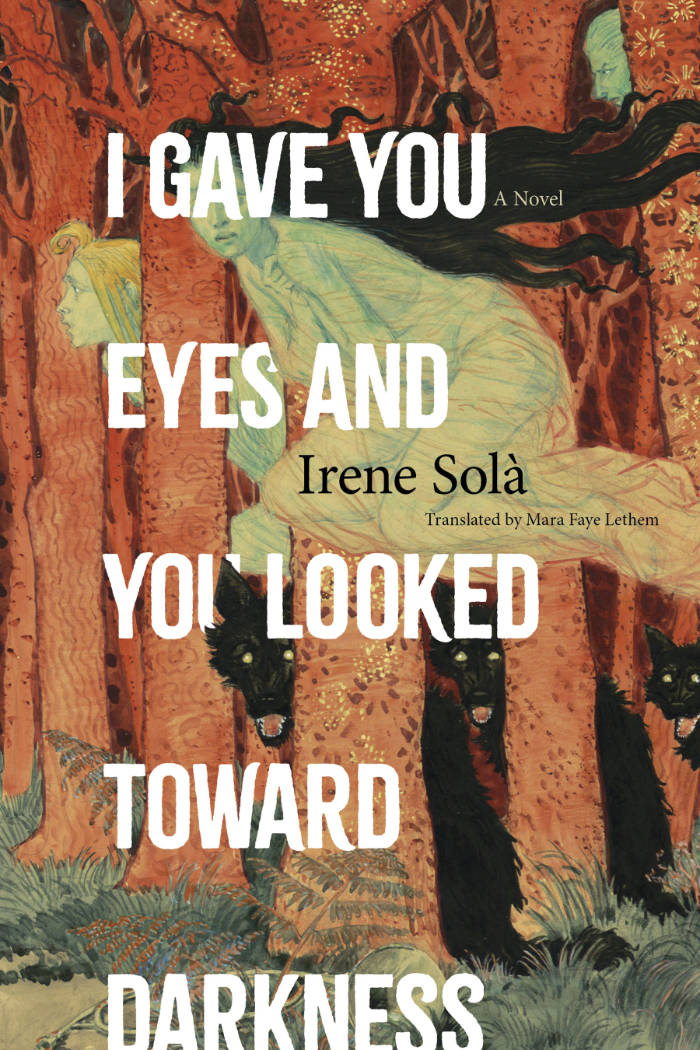
I Gave You Eyes and You Looked Toward Darkness
Dawn is breaking over the Guilleries, a rugged mountain range in Catalonia frequented by wolf hunters, brigands, deserters, race-car drivers, ghosts, and demons. In a remote farmhouse called Mas Clavell, an impossibly old woman lies on her deathbed. Family and caretakers drift in and out. Meanwhile, all the women who have lived and died in that house are waiting for her to join them. They are preparing to throw her a party.
As day turns to night, four hundred years’ worth of stories unspool, and the house reverberates with raucous laughter, pungent feasts, and piercing cries of pleasure and pain. It all begins with Joana, Mas Clavell’s matriarch, who once longed for a husband—“a full man,” perhaps even “an heir with a patch of land and a roof over his head.” She summoned the devil to fulfill her wish and struck a deal: a man in exchange for her soul. But when, on her wedding day, Joana discovered that her husband was missing a toe (eaten by wolves), she exploited a loophole in her agreement, heedless of what consequences might follow.
I Gave You Eyes and You Looked Toward Darkness is an audacious and entrancing novel in which the lines between the dead and the living, past and present, story and history are blurred. In it, Irene Solà draws on oral tradition as well as art, literature, and fairy tales to tell a completely new kind of story.

Across the Acheron
In her darkly funny 1985 take on Dante’s Divine Comedy, acclaimed French writer and activist Monique Wittig restages the journey through the circles of hell, limbo, paradise from a lesbian feminist perspective.
Never-before published in the US, Across the Acheron follows the adventures of “Wittig” and her anti-Virgilian guide through laundromats, billiard parlors, dyke bars, and picnic grounds of a 1980s San Francisco populated by hunters and their prey, lost souls, and fantastical beasts, including a robotic eagle and angelic bikers. Wittig reimagines Dante’s epic poem through a feminist and queer lens, subverting his cosmological order and upending gender identities and literary traditions. This edition brings the English translation of Wittig’s final novel back into print for the first time since the early-1990s, revised according to the author's notes, and with a new introduction by Sophie Lewis.
“Across the Acheron is a work of lesbian struggle and triumph across two kinds of hell. The hell of the classic western literary canon—and the hell of San Francisco. Monique Wittig brings all of her writerly powers and political experience to bear here, as witness to the horrors of heterosexual patriarchy and also to the possibility of another world for another life. Her work is a rare combination of deeply felt materialism and radical linguistic freedom. If we're to have another world, we'll need to create another language. She knew that, and she lived it.” — McKenzie Wark
“Even in fiction Monique Wittig’s writing is critical, prescient, brilliant, satirical, searing, and way ahead of its time. I’m so glad this work is back in circulation to revisit and revel in.” — Pamela Sneed
“In this unendurable yet compelling journey through the circles of patriarchal hell, Wittig encounters hordes of tortured women who do not struggle against their oppressors. Their brainwashing is as difficult to witness as their bloodied flesh. Only through communal activism does the seeker’s soul becomes tough enough to enter Paradise, where bare-breasted angels dismount motorcycles and offer baskets of 'cherries, strawberries, raspberries, apricots, peaches, plums, tomatoes, avocados, green melons, cantaloupes, watermelons, lemons, pawpaws, pineapples and coconuts.’ The bounties of Across the Acheron are lush and many.” — Dodie Bellamy
“A Guernica of the human (feminist) condition, a blacker, bleaker, more vengeful Alice’s tea party, this is a novel as graphic as a painting, whose brilliance its translators have creditably preserved.” — Publishers Weekly
Introduction by Sophie Lewis
Translated by David Le Vay with Margaret Crosland

The Lesbian Body
In this genre- and gender-breaking work of theory-fiction, legendary writer and cofounder of the 1970s French feminist movement Monique Wittig celebrates the body—lesbian, literary and defiantly political—and challenges the order of heterosexuality in literature.
First published in French in 1973, The Lesbian Body mines the relationship between a lover and a beloved—also a writer and a text—to explore the ideological and historical constructions of the female subject. Organized according to the principle of montage, poetic passages are juxtaposed with anatomic lists that mark lesbian eros. Through expressions of joy, violence, and tenderness, the site of pleasure is celebrated. In her transfiguration of gender and its paradigms, Wittig transformed French vocabulary, feminizing grammar and lesbianizing myths. This edition brings the English translation of Wittig’s groundbreaking work back into circulation for the first time since the mid-1980s, revised according to the author's notes, and with an introduction by Paul B. Preciado.
“The Lesbian Body is a fundamental work of lesbian existence. Wittig's applied vision is a state of natural delirium, a revolutionary excess of utopianism, refusal, and mutual self-creation. Revisiting it reveals how much passionate free thought has been lost, and simultaneously, how many of her tropes and discoveries have integrated into our collective consciousness.” — Sarah Schulman
“In this stunning new rendering of The Lesbian Body by the French author, theorist, activist and teacher, the late Monique Wittig, we are plunged into an imagined world of passionate violence and erotic lesbian mayhem intertwined in strikingly bold poetic images. Wittig, in the reach and volatility of her imagination, stands alongside such important American writers as Audre Lorde, Adrienne Rich, and Valerie Solanas, all of whose work deserves to be read again, or for the first time.” — Esther Newton
“To read the book is to be forced by Wittig into another grammar and happily contaminated by its strange forms. You will never think straight again.” — Jack Halberstam
“For me, Wittig opened up a sense of the world that had been, quite literally, unimaginable. She tore us apart.” — Judith Butler
“Together with Ursula Le Guin and Samuel R. Delany, Wittig is the first to design a nonbinary utopia, a world in which the binary categorization of sexes and genders will have ceased to exist.” — Paul B. Preciado
Introduction by Paul B. Preciado
Translated by David Le Vay
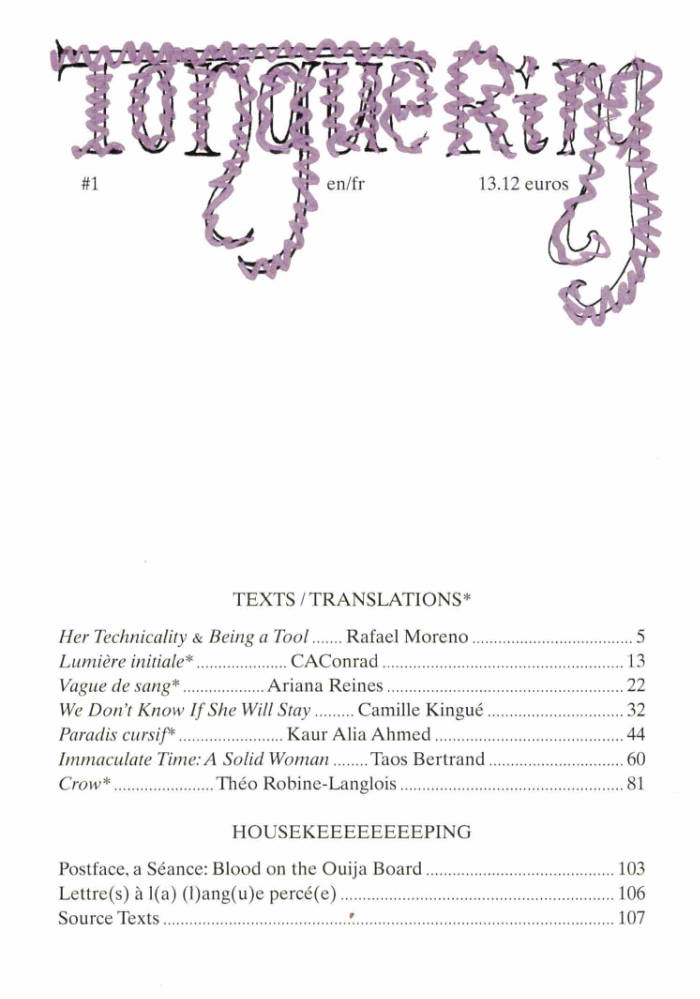
Tongue Ring: Issue 01
Aodhan Madden, Claire Star Finch
Oh oh this is the first issue of Tongue Ring, a journal of experimental writing in English & French, with original contributions and translations of texts* by Ariana Reines*, CAConrad*, Camille Kingué, Kaur Alia Ahmed*, Rafael Moreno, Taos Bertrand, and Théo Robine-Langlois*.
Vous voyez, c’est ça mon genre. Je ne sais pas ce que c’est.
Mais c’est mon genre. J’ai cet esprit en moi—qui est très ému
par la féminité. Je pourrais me mettre à pleurer. Je veux poser
mon manteau par terre pour la laisser marcher dessus
—Ariana Reines
Premier numéro de la nouvelle revue fantastique et bilingue (FR + EN) d’écriture expérimentale Tongue Ring, avec des contributions originales ainsi que des traductions* de textes de Ariana Reines*, CAConrad*, Camille Kingué, Kaur Alia Ahmed*, Rafael Moreno, Taos Bertrand, and Théo Robine-Langlois*.

The Autobiography of H. LAN Thao Lam
Situated between memoir, social criticism, and conceptual art, The Autobiography of H. Lan Thao Lam is an incisive response to a modernist classic and an affecting exploration of the poetics and politics of our times. "We are supposed to know where we are with biography and autobiography, they are the literary equivalents of the portrait and the self-portrait," writes Jeanette Winterson about Gertrude Stein's 1932 classic, The Autobiography of Alice B. Toklas. By narrating her own story from the perspective of her partner, Stein invented a literary form that was both intimate and uncanny, blurring lines of authority and identity as it winds through a story of two women living and loving together through a tumultuous moment in history. Almost a century later, experimental filmmaker and artist Lana Lin has resurrected Stein's project to tell another story of queer love, life, and artistic collaboration in a differently discordant age. At heart a candid chronicle of her partner Lan Thao's life journey from Vietnam during the war and her own troubled history as a gender-queer Taiwanese American, Lin's Autobiography draws in subjects as varied as photography, tropical fruit, New York real estate, and queer theorist Eve Sedgewick's eyeglasses, weaving a landscape of living that is also a critical investigation of race and gender in our time.
Lana Lin is a writer, artist, and filmmaker based in New York and Connecticut. She is the author of the book Freud's Jaw and Other Lost Objects: Fractured Subjectivity in the Face of Cancer and film and video works including The Cancer Journals Revisited. Her various works and collaborative projects (with Lan Thao Lam as "Lin + Lam") have exhibited at festivals and art and educational spaces throughout the world, including the Museum of Modern Art, Whitney Museum, and New Museum, New York; The National Gallery of Art, Washington, D.C.; Gasworks, London; the Taiwan International Documentary Festival and Taiwan Film and Audiovisual Institute, New Taipei City; Arko Art Center, Korean Arts Council, Seoul; and the 2018 Busan Biennale. Having had three years of psychoanalytic training before dropping out, she sometimes still dreams of becoming a psychoanalyst one day.
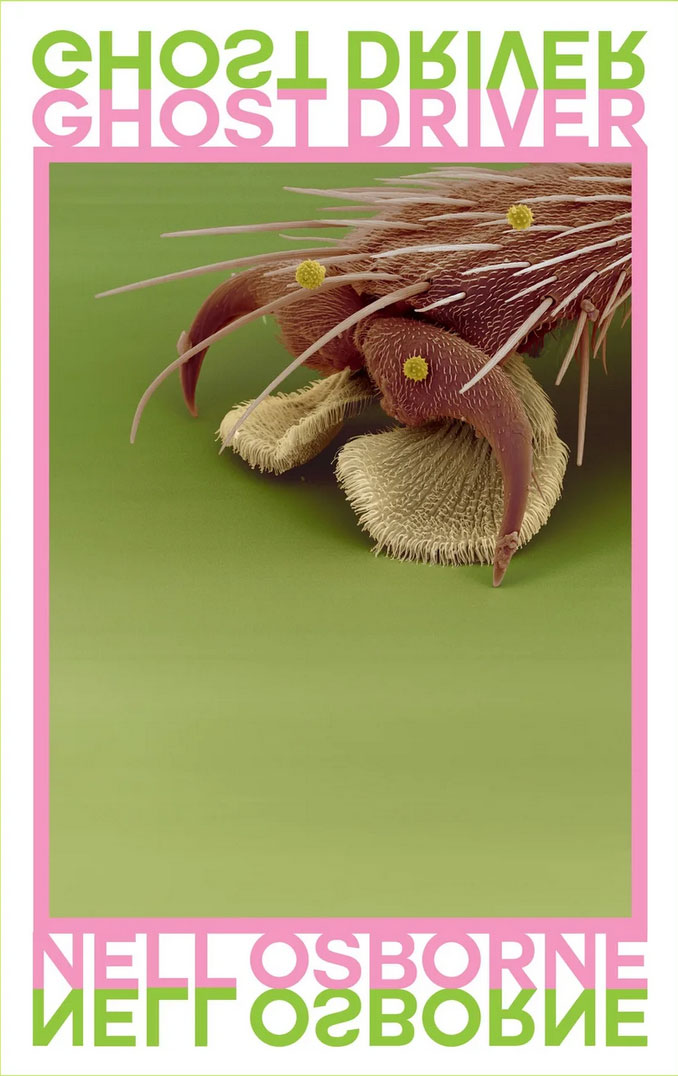
Ghost Driver
Malory walks home after an ordinarily gruelling night out, having escaped the company of her associates. Something ripples in the darkness. The shape of a figure. So begins a chain of events with the texture of dream plasma. A story of persecution mania. Professional ignominy. A sudden disappearance. The terror of seeing oneself too clearly...
Part horror story, part tragicomic nightmare, Ghost Driver is a slim shudder of a novel about a woman who has taken every wrong turn available to her.
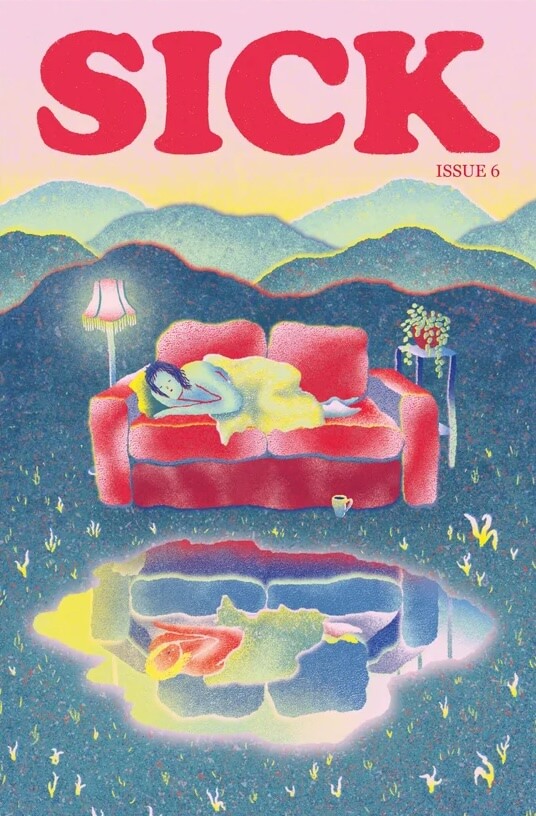
Sick issue 6
Writing on the fragmentation of chronic illness, why ‘full access’ isn’t something arts venues should aim for, the complexities of receiving gender-affirming care while living with chronic illness, the realities of constantly having to ration your energy, an interview with musical artist Dead Gowns, abortion access and bodily autonomy, poetry, artwork, book recommendations, and much more.
Essays, features, poetry, art, interviews & more from Vida Adamczewski, A/Bel Andrade, Amy Berkowitz, Khairani Barokka, Jax Bulstrode, Sarah Courville, Jen Deerinwater , Amy Dickinson, Mizy Judah Clifton, Alton Melvar M Dapanas, Dead Gowns, Sergey Isakov, Theo LeGro, Elias Lowe, Cathleen Luo, Jameisha Prescod, Olivia Spring, Leigh Sugar, Oriele Steiner, Emerson Whitney, Chantal Wnuk, Caroline Wolff, and Emma Yearwood
SICK is an independent, thoughtful magazine exploring illness and disability, founded & edited by Olivia Spring and designed by Kaiya Waerea. Founded in Norwich, UK in 2019, we are currently based in Maine, USA and London, UK. We typically publish one issue per year.
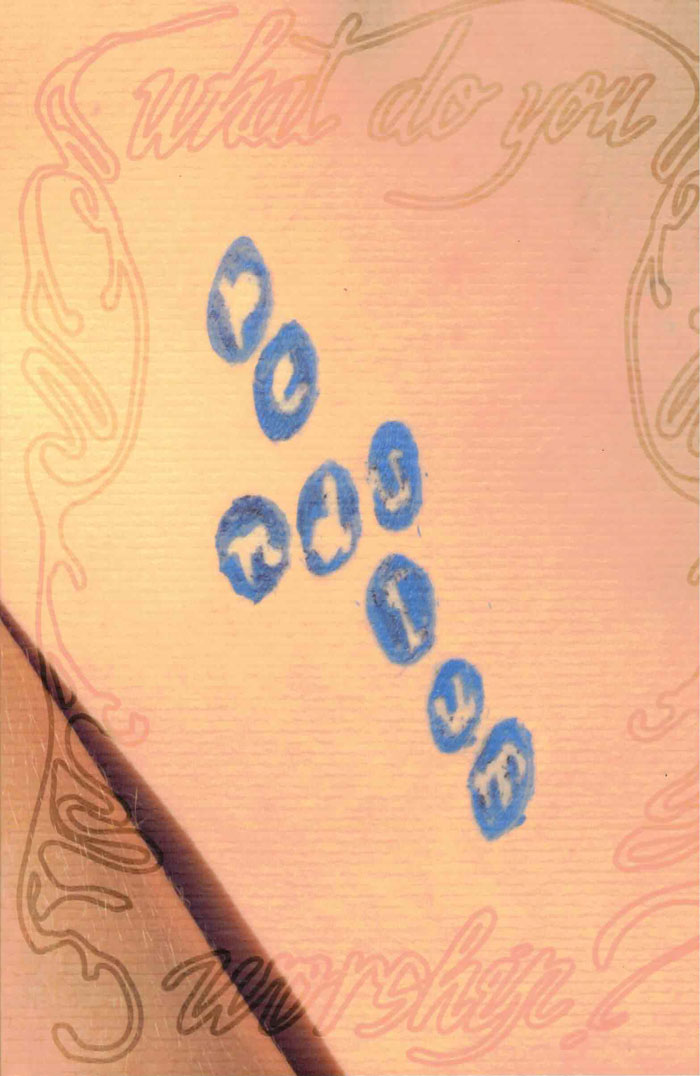
What do you worship?
What do you worship? What claims your time, your faith, your silence? What are the icons you carry, the relics you protect, the devotions that define you?
For our inaugural issue, we invite you to reflect on the objects, ideas, rituals, and obsessions that shape your devotion. Worship is not confined to temples or texts, it flickers in longing glances, whispered prayers, silent routines, and fervent beliefs. It can be sacred or profane, communal or solitary, chosen or inherited.
We encouraged our writers and artists to interpret this theme freely, critically, emotionally, playfully, or abstractly. Whether they explored worship through fiction, nonfiction, poetry, visual art, or hybrid forms, we were looking for work that comforts, commands, or consumes.
This issue features art and writing from: Triinu Silla, Michel Krysiak, Anna Tracey, Antonina Anna Kubicka, Ari Wentz, Jonathan David Sijl, Renacuajo Sánchez, Florence Hutchinson, Marta Calero Segura, Eden Ridout, Artémis Toumi, Simone Viola, Zoe Pappouti, Laura Soto Sánchez, Autumn Anderson, Woodkern, Cathal McGuire, Nena Pawletko, Ignacio Aguilera, Marine Victoria Lobos Garay, Andreea Luță, Isabel Ferreras González, Rafael Torrubia, Emilia Tapia, KC Willis, Simon Jin, Jacky Weerman, Róisín Gallagher, and Rin Anishchanka.
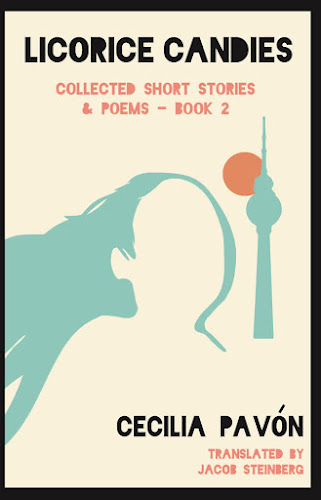
Licorice Candies
Cecilia Pavón, Jacob Steinberg
Licorice Candies collects short stories and poems written during the author’s most experimental and frenzied phase. The backdrop shifts from barren plazas in Buenos Aires to basement parties in Berlin. “I wished that, by continually moving horizontally, in a straight line, my body would touch Germany…that you could reach Berlin from Buenos Aires in a second without any planes that all the coolest cities in the world were each a continuation of the next: Lima, Buenos Aires, Berlin.” The medium through which these desires manifest is the Internet. The Internet—a ubiquitous force that becomes the notebook for the author’s poetry: typo-ridden love letters the grammarless confessions of a polyglot a geography that bends to the author’s will, making everything closer, more intimate.
Translated from Spanish by Jacob Steinberg
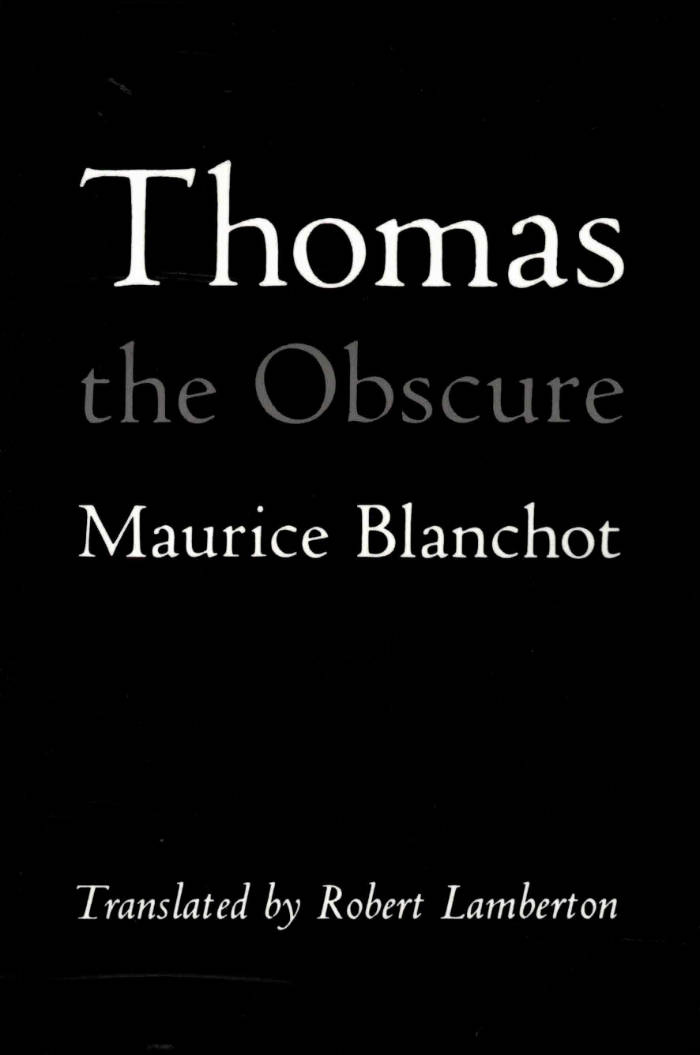
Thomas the Obscure
Maurice Blanchot, Robert Lamberton
Before Sartre, before Beckett, before Robbe-Grillet, Maurice Blanchot created the new novel, the ultimate post-modern fiction. Written between 1932 and 1940, Blanchot's first novel, here brilliantly translated by Robert Lamberton, contains all the remarkable aspects of his famous and perplexing invention, the ontological narrative—a tale whose subject is the nature of being itself. This paradoxical work discovers being in the absence of being, mystery in the absence of mystery, both to be searched for limitlessly. As Blanchot launches this endless search in his own masterful way, he transforms the possibilities of the novel. First issued in English in 1973 in a limited edition, this re-issue includes an illuminating essay on translation by Lamberton.
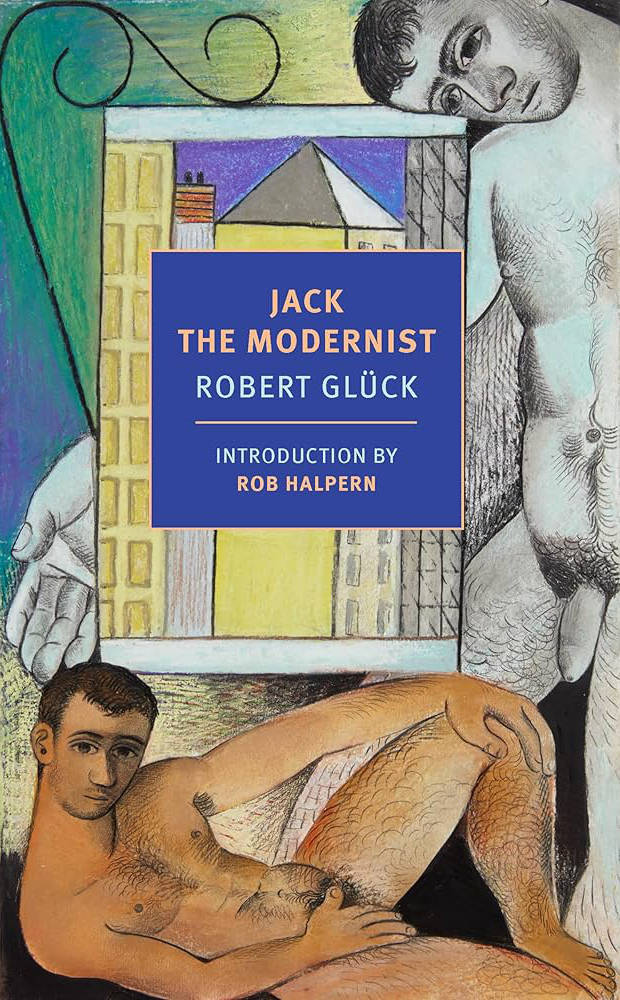
Jack the Modernist
A classic of postmodern fiction, Robert Glück’s Jack the Modernist portrays the slow disintegration of a love affair set in the early 1980s. Bob is excited and lonely. He meets and pursues the elusive Jack, a director who is able to transform others without altering himself. Bob goes to the baths, gossips on the phone, goes to a bar, thinks about werewolves, has an orgasm, and discovers a number of truths about Jack. Out of print for decades, Glück’s paean to desire and obsession explores the everyday in an idiom both intimate and lush. Sensual as well as sensational, self-conscious, but never self-serious, Jack the Modernist is a candid and heartfelt lover’s discourse unlike any other.
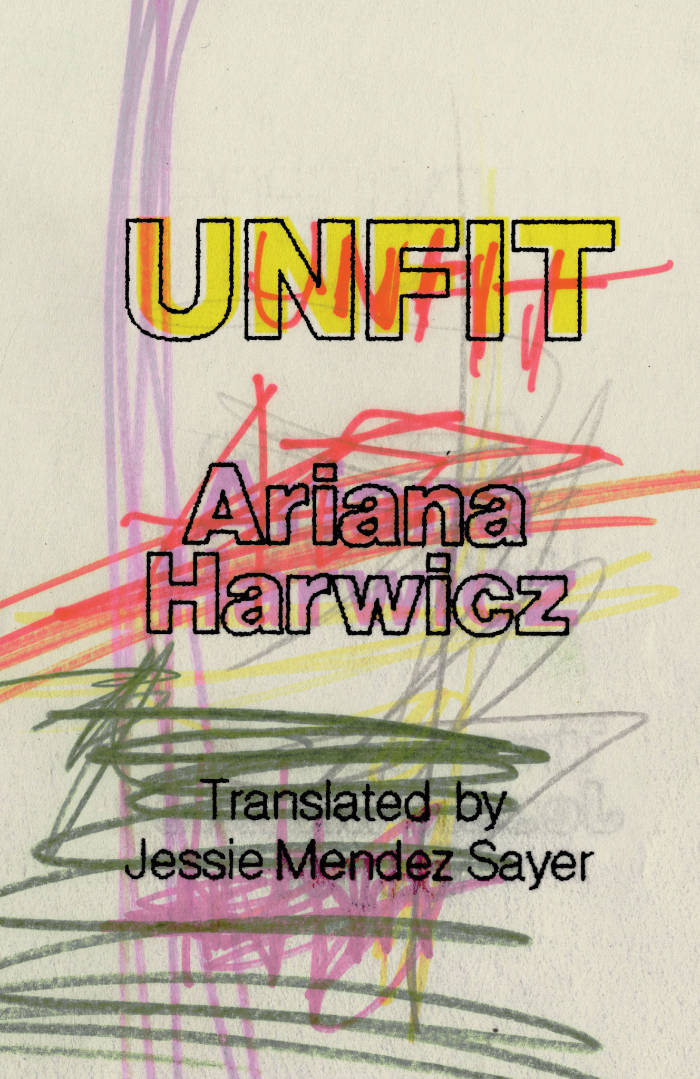
Unfit
Ariana Harwicz, Jessie Mendez Sayer
A bracing novel that asks how far we would go for the ones we love—and what we would do to destroy the ones we hate.
Lisa has lost custody of her young twin boys. Caught between the French legal system’s sluggish bureaucracy and her sinister, scheming in-laws, she’s alone and lost, an Argentine migrant in rural France picking grapes for a pittance, only allowed to see her children in supervised visits once a month. Scapegoated and outcast, destitute and desperate, Lisa decides to take radical action: early one morning, she sneaks into her in-laws’ farmhouse, takes back her children, sets the barn ablaze, and makes her escape.
What follows is a white-knuckled road trip that explores human beings pushed to the edge. Clearly, Lisa is not in her right mind, and as Harwicz deftly mingles a chorus of contradictory voices into her very unreliable narration, the reader comes to regard the protagonist with an unsettling mixture of sympathy and suspicion. Written in savage, chiseled prose, Unfit shoots off, a gripping chase that questions all our assumptions—and points out our hypocrisies— about motherhood, custody rights, love, violence, anti-semitism, and migration. The latest novel by the acclaimed author of Die, My Love (soon to be adapted to a film starring Jennifer Lawrence), Unfit is addictively terrifying, savagely sophisticated, and shockingly brilliant.
Translated from Spanish by Jessie Mendez Sayer

Nymph: A Novel
A young woman from a long line of assassins, lives her life with the ardent mission to avoid the trappings of any enduring romantic love, while keeping one on the pursuit of an untimely death for herself.
Not yet thirty, Bathory, or 'Bat' to those near to her, has assembled a peculiar Model, sex worker, linguist and scholar of Latin. But nothing in her lively job history employs the singular traits she inherited from her strange family, chief among them an uncanny ability to sidestep seemingly certain death(s). An appropriate atavistic instinct, for someone from a long line of assassins and spies. Her clan are assassins of a romantic bent, her parents issuing theories on love galore. However Bat is set on swerving any enduring romantic loves, and she's set on dying young. Now, if she could only avoid that one alluring figure from her father's past.
A thriller, a love story, and a dynamic examination of class, violence and connection. The images we make to share and those we strive to conceal, alienation and salvation, magic and technology, LaCava's bold new novel is propelled by the compelling violence one can seed in contradiction.

Holy Smoke
Why they said, “Your real name is Anon,” I’ll never know ... But now that I have a name, I know I must write ... I’m scared, but feel it is time to be really bad.
Republished for the first time since its 1979 release, in a new revised edition, Holy Smoke is an account of the frenzy and paranoia of United States politics refracted through one individual’s psyche. With her theme of a child disappeared – and all that that phrase carries with it – Howe captures the chaos of reality in her salient mix of poetry and prose. Readers will find it hard to believe that this book, which gives fresh sense to the demand for universal human rights, was written in the last century.
At once evocative and subtly incisive, Howe’s writing seems almost like a new language, a language that has been in hiding. She can make the familiar haunting and the ordinary a provocation. She has written some of the remarkable books of her time. —Adam Phillips
A wonder of acid wit and Americana, Holy Smoke turns grief into a game and chaos into canticles. Bricolage at its best: incisive, inventive and intimate. It’s the exact work I needed in my life. —Navid Sinaki
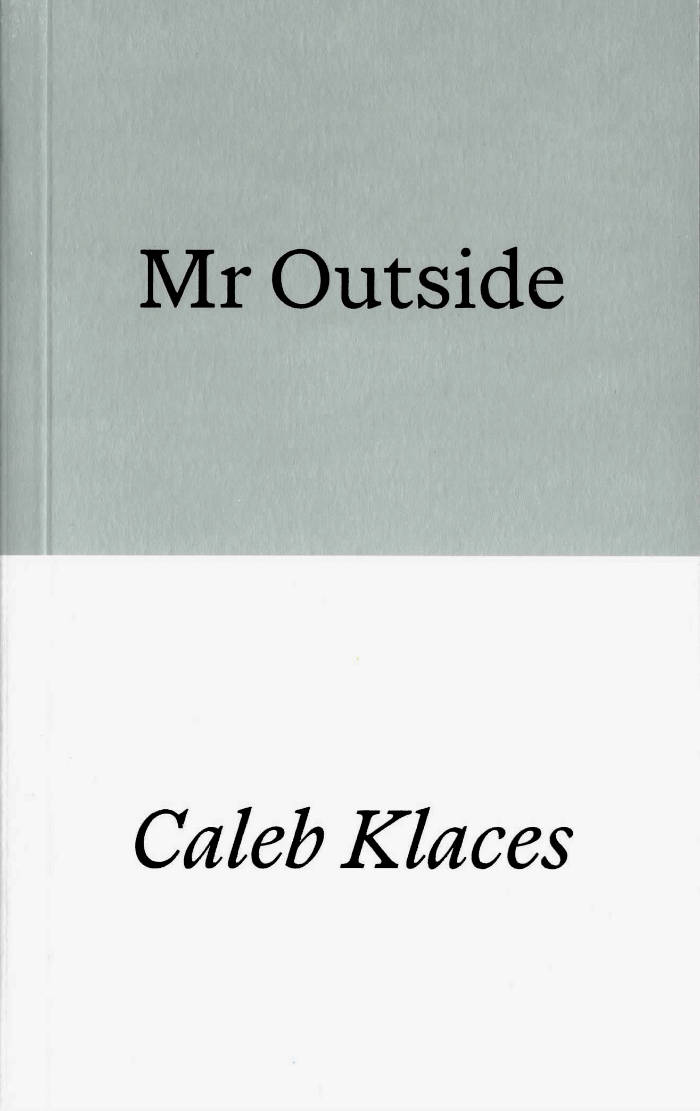
Mr. Outside
During a time of restricted movement, the narrator of Mr Outside visits his reclusive father Thomas who is packing up to move into a care home. As father and son grapple with the task, long-buried conflicts resurface. Thomas, a poet and former radical priest, slips between affection and fear, while the narrator struggles to find the words he’s been holding back. Yet amidst confusion and grief, moments of humour and connection emerge, as both men discover new ways to listen.
Told through a striking combination of text and image, Klaces’ distilled novel explores the stories we tell about our lives, intimacy in crisis, and the fragile line between reality and delusion. Based on the life of his own father, Mr Outside is poignant, profound, and unexpectedly funny; a tender meditation on endings, the limits of understanding, and the act of letting go.
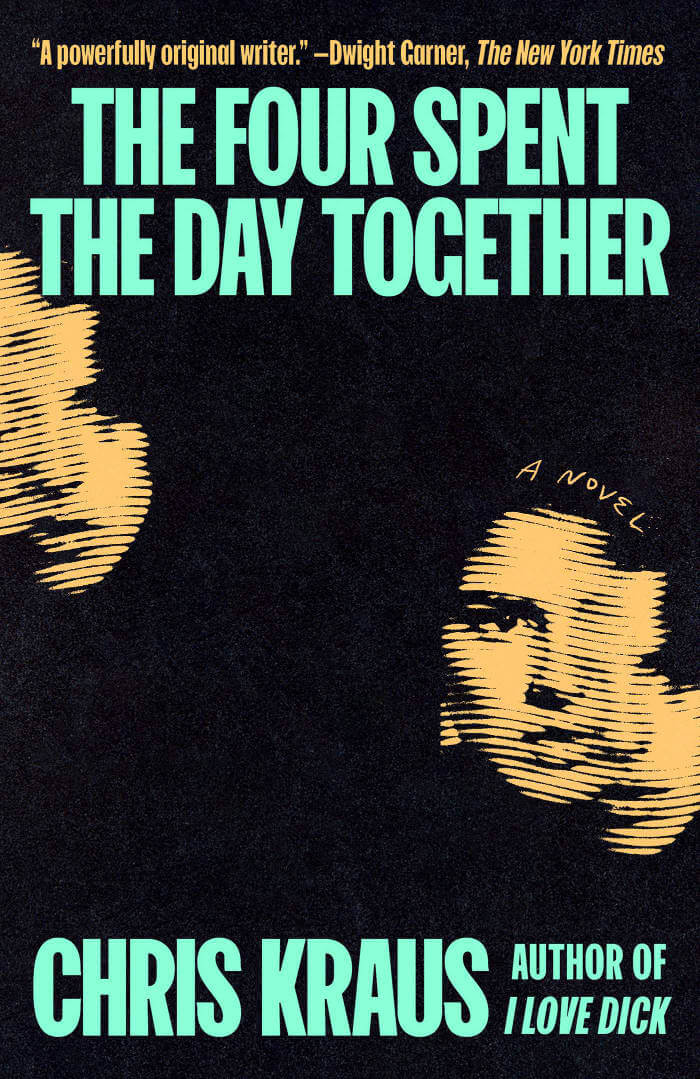
The Four Spent the Day Together
An unforgettable new novel from the “powerfully original” (Dwight Garner, The New York Times) author of the cult classic I Love Dick—a stark, witty journey into a fractured, violent America, culminating in the investigation of a teenage murder on Minnesota’s Iron Range.
On the Iron Range of northern Minnesota, at the end of the last decade, three teenagers shot and killed an older acquaintance after spending the day with him. In a cold, depressed town, on the fringes of the so-called “meth community,” the three young people were quickly arrested and imprisoned.
At the time of the murder, Catt Greene and her husband, Paul Garcia, are living nearby in a house they’d bought years earlier as a summer escape from Los Angeles. Locked into a period of personal turmoil, moving between LA and Minnesota—between the art world and the urban poverty of Paul’s addiction therapist jobs, the rural poverty of the icy, depressed Iron Range—Catt turns away from her own life and towards the murder case, which soon becomes an obsession. In her attempt to pierce through the brutality and despair surrounding the murder and to understand the teenagers’ lives, Catt is led back to the idiosyncratic, aspirational lives of her parents in the working-class Bronx and small-town, blue-collar Milford, Connecticut.
Written in three linked parts, The Four Spent the Day Together explores the tensions of unclaimed futures and unchosen circumstances in the age of social media, paralyzing interconnectedness, and the ever-widening gulf between the rich and poor.
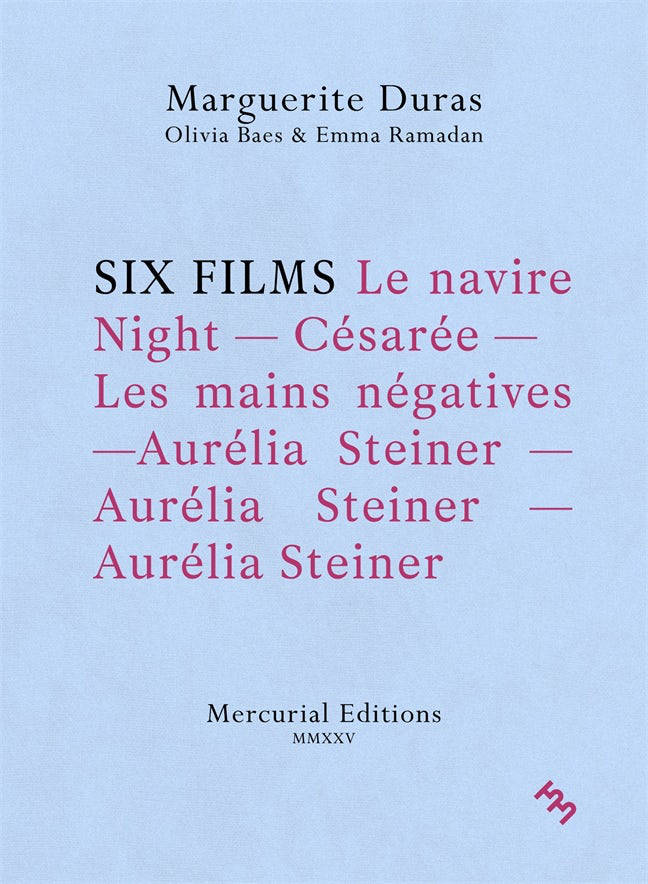
Six Films
The English-language debut of a beautiful and beguiling cycle of experimental texts by the legendary Marguerite Duras.
In the late 1970s, Marguerite Duras embarked on an experimental journey to expand the boundaries of writing and film. For Duras, writing need not be text on a page nor cinema merely images on a screen. Six Films is the result of her efforts to redefine the two arts in order to create a hybrid work. Taking narration, voiceovers, and dialogue from six of her films, Duras re-envisions them as extended prose poems and monologues, tangling with self-identity, personal relationships, colonialism, and expression as the celluoid images recede and the text becomes the film itself. Now available for the first time in English, Six Films is a document of an artist at the apex of her creative prowess.
Translated by Olivia Baes and Emma Ramadan.

Death Sentence
This long awaited reprint of a book about which John Hollander wrote: “A masterful version of one of the most remarkable novels in any language since World War II,” is the story of the narrator’s relations with two women, one terminally ill, the other found motionless by him in a darkened room after a bomb explosion has separated them. “Through more than 40 years, the French writer Maurice Blanchot has produced an astonishing body of fiction and criticism,” writes Gilbert Sorrentino in the New York Review of Books, and John Updike in The New Yorker: “Blanchot’s prose gives an impression, like Henry James, of carrying meanings so fragile they might crumble in transit.”
Translated from the French by Lydia Davis.